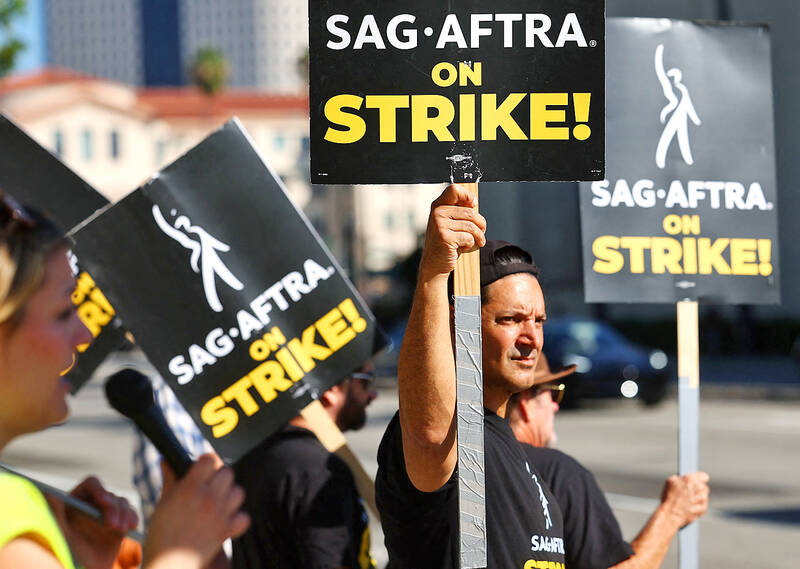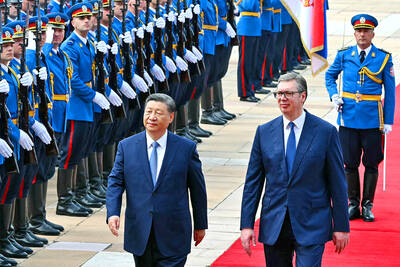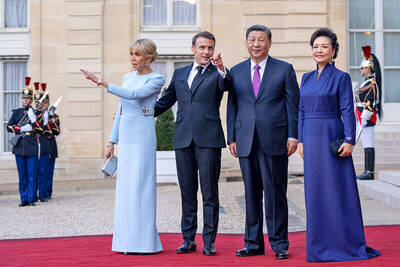Hollywood’s writers’ strike was declared over on Tuesday after nearly five months when board members from their union approved a contract agreement with studios, bringing the industry at least partly back from a historic halt in production.
The governing boards of the eastern and western branches of the Writers Guild of America and their joint negotiating committee all voted to accept the deal, two days after the tentative agreement was reached with a coalition of Hollywood’s biggest studios, streaming services and production companies.
After the vote they said that the strike would be over and writers would be free to start on scripts at 12:01am yesterday.

Photo: AFP
Late-night talk shows — the first to go dark when writers walked out on May 2 — are likely the first shows to resume.
Scripted shows would take longer to return, with actors still on strike and no negotiations yet on the horizon.
The writers still have to vote to ratify the contract themselves early next month, but lifting the strike would allow them to work during that process, the guild told members in an e-mail.
After Tuesday’s board votes, the contracts were released for the first time to the writers, who had not yet been given any details on the deal, which their leaders called “exceptional.”
The three-year agreement includes significant wins in the main areas writers had fought for — compensation, length of employment, size of staffs and control of artificial intelligence (AI) — matching or nearly equaling what they had sought at the outset of the strike.
The union had sought minimum increases in pay and future residual earnings from shows of between 5 and 6 percent, depending on the position of the writer. The studios had wanted between 2 and 4 percent.
The compromise deal was a raise of between 3.5 and 5 percent.
The guild also negotiated new residual payments based on the popularity of streaming shows, where writers would get bonuses for being a part of the most popular shows on Netflix, Max and other services, a proposal studios initially rejected.
Many writers on picket lines had complained that they were not properly paid for helping create heavily watched properties.
The writers also got the requirement they sought that shows intended to run at least 13 episodes would have at least six writers on staff, with the numbers shifting based on the number of episodes.
They did not get their desire for guaranteed staffs of six on shows that had not yet been ordered to series, settling instead for a guaranteed three.
Writers also got a guarantee that staff on shows in initial development would be employed for at least 10 weeks and that staff on shows that go to air would be employed for three weeks per episode.
On AI, the writers got the regulation and control of the emerging technology they had sought. Under the contract, raw, AI-generated storylines would not be regarded as “literary material” — a term in their contracts for scripts and other story forms that a screenwriter produces.
This means they would not be competing with computers for screen credits. Nor would AI-generated stories be considered “source” material, their contractual language for the novels, video games or other works that writers might adapt into scripts.
Writers have the right under the deal to use AI in their process if the company they are working for agrees and other conditions are met, but companies cannot require a writer to use AI.
Still-striking members of the Screen Actors Guild-American Federation of Television and Radio Artists returned to the picket lines earlier on Tuesday for the first time since the writers struck their tentative deal, and they were animated by a new spirit of optimism.
“For a hot second, I really thought that this was going to go on until next year,” said Marissa Cuevas, an actor who has appeared on the TV series Kung Fu and The Big Bang Theory. “Knowing that at least one of us has gotten a good deal gives a lot of hope that we will also get a good deal.”

MONEY MATTERS: Xi was to highlight projects such as a new high-speed railway between Belgrade and Budapest, as Serbia is entirely open to Chinese trade and investment Serbian President Aleksandar Vucic yesterday said that “Taiwan is China” as he made a speech welcoming Chinese President Xi Jinping (習近平) to Belgrade, state broadcaster Radio Television of Serbia (RTS) said. “We have a clear and simple position regarding Chinese territorial integrity,” he told a crowd outside the government offices while Xi applauded him. “Yes, Taiwan is China.” Xi landed in Belgrade on Tuesday night on the second leg of his European tour, and was greeted by Vucic and most government ministers. Xi had just completed a two-day trip to France, where he held talks with French President Emmanuel Macron as the

With the midday sun blazing, an experimental orange and white F-16 fighter jet launched with a familiar roar that is a hallmark of US airpower, but the aerial combat that followed was unlike any other: This F-16 was controlled by artificial intelligence (AI), not a human pilot, and riding in the front seat was US Secretary of the Air Force Frank Kendall. AI marks one of the biggest advances in military aviation since the introduction of stealth in the early 1990s, and the US Air Force has aggressively leaned in. Even though the technology is not fully developed, the service is planning

INTERNATIONAL PROBE: Australian and US authorities were helping coordinate the investigation of the case, which follows the 2015 murder of Australian surfers in Mexico Three bodies were found in Mexico’s Baja California state, the FBI said on Friday, days after two Australians and an American went missing during a surfing trip in an area hit by cartel violence. Authorities used a pulley system to hoist what appeared to be lifeless bodies covered in mud from a shaft on a cliff high above the Pacific. “We confirm there were three individuals found deceased in Santo Tomas, Baja California,” a statement from the FBI’s office in San Diego, California, said without providing the identities of the victims. Australian brothers Jake and Callum Robinson and their American friend Jack Carter

CUSTOMS DUTIES: France’s cognac industry was closely watching the talks, fearing that an anti-dumping investigation opened by China is retaliation for trade tensions French President Emmanuel Macron yesterday hosted Chinese President Xi Jinping (習近平) at one of his beloved childhood haunts in the Pyrenees, seeking to press a message to Beijing not to support Russia’s war against Ukraine and to accept fairer trade. The first day of Xi’s state visit to France, his first to Europe since 2019, saw respectful, but sometimes robust exchanges between the two men during a succession of talks on Monday. Macron, joined initially by EU Commission President Ursula von der Leyen, urged Xi not to allow the export of any technology that could be used by Russia in its invasion